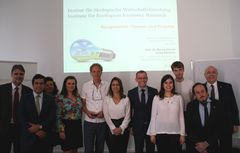Brazilian parliamentarians visit IÖW to learn more about climate protection
A group of parliamentarians from Brazil visited the IÖW on 3 June 2019 and discussed with energy expert Prof. Bernd Hirschl findings from many years of research at the IÖW on the German energy system transformation and the resulting recommendations for the design of environmentally friendly and climate-friendly energy systems. Jonas Pentzien presented results from the Konsumwende project, in which the IÖW, on behalf of the German Federal Agency for Nature Conservation, examines how the German demand for soya is threatening the biodiversity of the Cerrados savannah in Brazil. The visit took place as part of the guest programme of the Federal Republic of Germany on "Climate Protection and the Role of Parliament" and was organised by the Federal Foreign Office.
Climate protection in politically turbulent times
Brazil has long been an important player in international climate protection policy. But President Jair Bolsonaro, who has been in office since January 2019, is not announcing the fight against climate change, but against climate protection: He is considering withdrawing from the Paris climate protection agreement, cutting the Environment Ministry's budget and at the same time shrinking the rainforest. While Brazil's president is fighting climate change, others are working to avert it.
The Brazilian delegation consisted of two senators and six deputies from different parties - from government to opposition. Bernd Hirschl explained to the delegates, among other things, recommendations that the IÖW developed together with partners for the German Coal Commission: They show that it is possible to secure both energy supply and jobs through the intelligent use of wind and photovoltaics. According to Bernd Hirschl, the principles of the results can also be applied to Brazil.
Sustainable consumption in Germany for more biodiversity in Brazil
IÖW scientist Jonas Pentzien discussed with the delegation the effects of German consumption on the environment in other countries: Germany is an important importer of Brazilian soya. Soy cultivation has turned many former pastures into monocultures. In addition, 94 percent of the soy plants cultivated in Brazil are genetically modified and particularly harmful to biodiversity due to the associated use of pesticides.
Pentzien proposed to introduce a labelling requirement for products in Germany, so that, for example, it could be ascertained in meat products whether the animal feed was genetically modified. According to current project results, such a measure would lead to an increase in demand for non-genetically modified food in Germany. This would enable Brazilian farmers to achieve higher consumer prices and reduce the negative effects of German consumption on the Brazilian environment.



